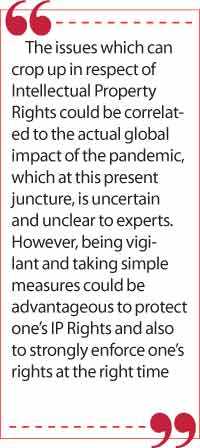Thursday Feb 12, 2026
Thursday Feb 12, 2026
Wednesday, 22 April 2020 00:00 - - {{hitsCtrl.values.hits}}

IP right owners should not be lulled into a false sense of security that owing to the lockdown, there would be no violations of their IP Rights – Pic courtesy ALLEA
The spreading of the COVID-19 pandemic has left Intellectual Property (IP) attorneys and their clients in alien legal territory as quarantine/curfew has been imposed, rendering the Courts and National Intellectual Property Offices non-functional. 
Survival has now become the primary objective to mankind; thus everything else seemingly has no purpose or meaning at the moment. However, one must not overlook the undeniable fact that this too shall pass and once it does, IP right owners should not be in a position where they come to realise that the horse has bolted in respect of their IP Rights.
A false sense of security could be lethal
In the prevailing circumstances, IP right owners should not be lulled into a false sense of security that owing to the lockdown, there would be no violations of their IP Rights. The “high” threat warning effected by Sri Lanka CERT recently, in respect of cybercriminals scamming in an attempt to phish confidential information (strictly not IP in nature) should be an eye-opener to all.
Due to the lockdown, businesses are having their work forces ‘Work from Home’ (WFH) and an increased number of online business platforms are being created.
While this author does not perceive that exclusively owing to the shift in business setups, that there would be a significant increase in IP infringements; the issues in respect of enforcing IP Rights at this juncture could be a crucial factor in curtailing infringements.
Possible increase in piracy of software
Traditionally, when an organisation deprived of capital, requires a unified communication and collaboration platform, such an organisation would be tempted to resort towards pirated software. However, with the introduction of free software such as Google Hangouts, Houseparty, Zoom, Apple face Time and partially free software like Blue Jeans, Skype and Team viewer, the need to resort to pirated paid software might be reduced to a great extent.
Nowadays employees working from home on their personal computers could operate without paid software such as MS Word or MS Excel owing to the popularisation of free software like LibreOffice. However, these free software are not without their faults as intimated by the Sri Lanka CERT notification in respect of the security threats of Zoom. [Security flaws in Zoom have been identified in the videoconferencing platform to the effect of a potential hacker being able to join a video meeting uninvited and listen in, potentially accessing any files or information shared during the meeting.]
Nevertheless, piracy may occur when professionals such as engineers, photographers, architects, sound engineers and graphic designers who rely on specialised paid software are required to work from home. These professionals would require specific software, which are expensive such as Solidworks, Adobe After Effects, Photoshop, Illustrator, and Ableton live. These software are exorbitantly expensive to be acquired by individuals and occasionally require add-ons, which require further expenditure.
It is important to note that piracy is incredibly difficult to prevent, owing to the continuous efforts of hackers engaged in hacking/bypassing Digital Rights Management (DRM) technology used to protect paid software. One solution would be for creators of professional software to consider utilising the latest DRM solutions used in the video game industry, which follows the bleeding edge of DRM technology. 
In the alternative, creators of such paid software could offer short term licenses to software for a lower fee, or convert as many apps as possible to web based apps so that users would be able to login from remotely, in order to use the software online. Furthermore, makers of paid software could take this as an opportunity and move to offer free trial periods in attempt to increase their potential user base.
Creeping Infringement: A possibility
The most common modus operandi resorted by IP perpetrators are through Creeping Infringement, where they test the waters by committing an infringing act in an insignificant manner, expecting the IP right owner to not react. Failure to react by the right owner, gradually promotes the infringer’s activity, most likely escalating such activity.
Generally, when the right owner reacts (typically after a period of time) the perpetrator would claim to have his own market share, and also resort to a defence in law termed tacit acquiescence. Right owners should try to avoid this. A leading brand, which was marketing beauty products in Sri Lanka, discovered after a period of time that an infringer was selling and marketing ‘curry powder’ in a remote location in Sri Lanka, using the same trademark. This matter is still in appeal in the Supreme Court.
Loss of secrecy in respect of confidential information
WFH could entail an employee to be granted access to the business entity’s information databases and other confidential information, which could be downloaded and accessed from a remote location. The employee’s computer could also be used by others. In these circumstances it is best to notify all employees of the implications in dealing with the entity’s commercially sensitive, undisclosed information from remote locations.
If there is any confidential information stored in one database, it is best to compartmentalise the information and provide employees access to limited segments of the information at any given time. If employees are entrusted with component-based tasks, access can be restricted.
Furthermore, all business entities could take steps to notify by way of a circular and imposing strict guidelines in respect of accessing and using the business entity’s commercially sensitive, confidential, business information.
Sri Lanka CERT on its website has set out ‘Work from Home Security Considerations,’ which all business entities can take cognisance and appraise all its employees. An employer could even get the employees to be bound by such through the strict guidelines, which could be imposed. Employees could also be advised to keep work related passwords in a confidential manner. Furthermore, employees should be notified of the harsh implications, which accrue through criminal and civil liabilities as per the Intellectual Property Act No. 36 of 2003, owing to dishonest use, acquisition or disclosure of such Confidential Information.
As a majority of the meetings in a corporate setup would take place through software applications, first and foremost it is a paramount that a proper survey is effected by an IT Expert in respect of the security ratings of the software intended to be used. This is paramount owing to the recent security issues with Zoom, which was most likely was caused due to oversubscription of users during this period, as conceded by its CEO.
It should be stressed that the online meetings should at all times be conducted confidentially. Employees should be advised to participate in these meetings and discussions in a confidential setup to in order to prevent any seepage of information. Breach of confidence in terms of the Intellectual Property Act is an area of litigation which has considerably increased in the recent past.
Trademark infringement and unfair competition
At this juncture, where most trading and businesses are driven on online platforms, there could many offshoots or knock-off brands which might be caused to come into existence for a very short period of time, to make a swift return by piggybacking on an existing well known trademark or trade name.
It is possible to confuse customers on an online platform by using similar or a misleadingly similar trademark or trade name, which closely resembles a well-established trademark or trade name. In this context, it is best for right owners to be extra vigilant and monitor online businesses and business entities which come into existence.
Steps to take when enforcement mechanisms are not functional
IP right owners should not be perturbed by the present state of affairs, i.e. in the backdrop where State resources and the Court system not being in full force to deal with IP right violations. The golden rule is that vigilance and prevention is better than any form of cure. Having said this, it might be concerning as to how a right owner could canvas and protect their IP Rights in these circumstances, where there is a complete lockdown in Sri Lanka. Obtaining legal advice might also be a difficult task owing to self-isolation and the quarantining process. Lawyers who could be consulted online could be sought for urgent legal advice.
Enforcing mechanisms in Sri Lanka are presently non-operational: Redress to right owners?
The most sought after modality of enforcement and protection of IP Rights is the process of instituting legal proceedings in the Commercial High Court (located in the Western Province) under and in terms of the Intellectual Property Act No. 36 of 2003. An imminent threat could be restrained by way of an ex parte application seeking injunctive relief against perpetrators. This form of relief is instantaneous, and prevents the continuation of the infringement. It also maintains the status quo until the Court considers the substantive dispute.
Unfortunately, as it stands at this juncture, filing papers in respect of an infringement and taking matters before a Court of Law is a difficult task. (As at the date of this article owing to curfew and lockdown). The other modality of enforcement of IP Rights is by instituting proceedings in the Magistrate’s Court by way of a private plaint or an application lodged by the Police against an alleged perpetrator.
Unlike the Commercial High Court, though the Magistrates’ Courts in certain districts are presently functional, such are for the limited purpose of entertaining bail applications. Thus, the inability to enforce rights through a judicial process is disconcerting to right holders.
Collecting evidence of infringing acts and sending out Seize and Desist letters
When a similar or identical name or getup has been introduced to confuse members of the general public in an attempt to piggyback on established goodwill, it is best to immediately send out a Seize and Desist letter, preferably through an Attorney-at-Law.
Seemingly, traditional modes of courier and registered post might not be possible, however technological means such as E-mail or even social media platforms could be used to notify the perpetrator and also the general public in respect of the infringement. This could work as a deterrent.
Screenshots could be taken from a mobile device and the relevant dates and times of postings/adverts could be monitored. Trap orders are advisable in order to extract information from perpetrators. Same steps could be followed in an instance of an infringement of a patent, industrial design or a copyright work (such as movie, song or book).
Litigation which were to be instituted and halted
Right owners who were considering taking legal steps against perpetrators, but who were unable to proceed, should at least consider sending out Seize and Desist letters at the earliest and also take steps in collecting evidence and monitoring infringing acts.
Registerable IP Rights involving the NIPO
The process of registrations of registerable IP Rights such as trademarks, patents, industrial designs and integrated circuits could also be hampered owing to the National Intellectual Property Office (NIPO) being non-functional at the moment. Timelines in respect of lodging of applications, oppositions, pre-fixed inquiry dates would have to stand extended. NIPO can take a leaf from IP offices worldwide, which have been scrambling to adapt their practices in order to cater to this unprecedented situation.
As of 16 March, the European Intellectual Property Office (EUIPO) has extended all deadlines that expire between 9 March and 30 April to 1 May. Similarly, the European Patent Office (EPO) announced on 16 March that all deadlines are extended to 17 April and could be extended further if the disruption continues. The UK Intellectual Property Office (UKIPO) has announced that deadlines for patents, supplementary protection certificates, trademarks, and designs, which fall after 24 March are suspended until at least 17 April.
China’s National Intellectual Property Administration (CNIPA) indicated on 14 February that if trademark applicants and registration holders fail to meet deadlines due to the epidemic, the deadlines will be suspended from the date when business could no longer be handled normally due to prevention and isolation measures. Similar measures would have to be adopted by the NIPO. (The author is unaware of any such measures effected by the NIPO to date.)
Timelines for claiming priority in terms of certain registerable rights and also timelines for considering ‘Novelty’ which are positive requirements for patents and industrial designs would also have to be dealt with by the NIPO. Hence, if any registerable rights are pending in the form of applications before the NIPO, or any application is to be filed, a close scrutiny of the NIPO website by the applicant or its authorised agent should be effected.
Going forward
The issues which can crop up in respect of Intellectual Property Rights could be correlated to the actual global impact of the pandemic, which at this present juncture, is uncertain and unclear to experts. However, being vigilant and taking simple measures could be advantageous to protect one’s IP Rights and also to strongly enforce one’s rights at the right time.
[The writer is a Legal Counsel, where his Chambers primarily engages in the field of Commercial Law involving Intellectual Property Law Disputes, Company Law Disputes and Arbitrations. He is the International Chamber of Commerce (ICC) (YAF) Regional Representative for Sri Lanka. He is the Course Coordinator of Intellectual Property Law of the University of London LLB program at the CFPS Law School: University of London Registered Center and also a Lecturer at the Institute for the Development of Commercial Law and Practice (ICLP). The writer has been a member of the Council of the Open University of Sri Lanka, Kelaniya University and the Executive Committee of the Bar Association of Sri Lanka. He also functions as a Contributory to the World Bank Doing Business Index. He has obtained an Undergraduate (Hons) Degree in Human Genetics from the University of Nottingham and LLB (Hons) from the University of London. He is presently reading a LLM in International Corporate and Commercial Law from Kings College London and a LLM from the University of Colombo.]